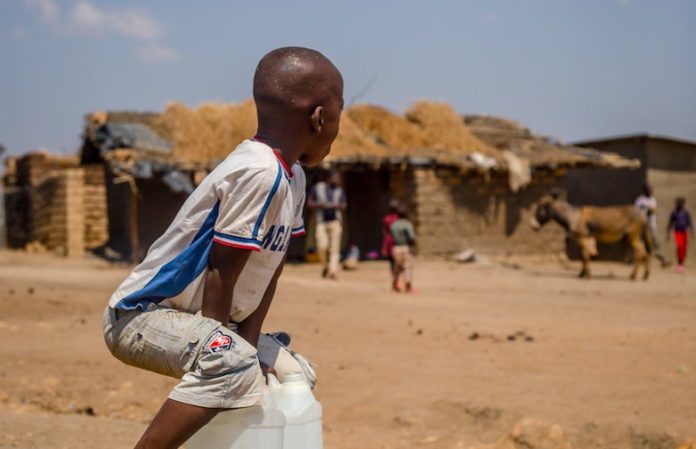
 By Antonia Lilie & Lene Maren Krog
By Antonia Lilie & Lene Maren Krog
It was a quiet, sunny day in Blantyre in Southern Malawi. We were seeking refuge from the heat of the afternoon sun in the shade of a large tree in the garden outside our hotel. The scene stood in dire contrast to where we had been just a few hours ago, in the middle of a dusty, overcrowded parking lot, 50 km further south.
In March 2019, Malawi was hit by the region’s worst cyclone in modern history, affecting 19 out of the country’s 29 districts. One of the worst affected districts was Chikwawa, which neighbours Blantyre in the Southern part of the country. Here lies the small town of Nchalo, which in the months since the cyclone became a temporary home to nearly 2,000 displaced families.
The camp was located on an empty parking lot the size of a small football field and was lined with a handful of tents. In the middle of the plot, people were sitting on the ground, seeking shelter from the scorching sun underneath pieces of propped-up cloth. Huddled together on the resulting square meter of shade was usually a family of at least five. More often, they were more.
Many of them had lived in other camps before coming to Nchalo, but these were quickly becoming overcrowded and people were forced to move. At the time of our visit, the camp in Nchalo was housing over 6,000 people, with more coming every day. The majority were women and children.
For lack of official help, residents from the local community had taken charge of coordinating the over 6,000 people living in the camp.
For lack of official help, residents from the local community had taken charge of coordinating the over 6,000 people living in the camp. They explained that the camp had been set up to relieve some of the pressure from overcrowded camps closer to the affected areas. Support of the camp in Nchalo, however, had been minimal, with unpredictable and insufficient supplies from both government and international organizations. Deliveries of food and other necessities had been sporadic and inconsistent, and the latest delivery of maize was estimated to cover only 208 out of the nearly 2,000 families staying in the camp. This meant that only the most vulnerable would receive a share, while the others would have to go days without food again.
Malawi and the world
Over 3 million people were impacted by the cyclone across Mozambique, Zimbabwe, and Malawi. These were the hardest-hit countries in what the UN refers to as the worst storm to hit the Southern Hemisphere in recent times. As the death toll surpassed 1,000, Idai proved to be the third deadliest tropical cyclone in the Global South.
The response to the crisis in Western media was immediate and widespread, drawing much attention and donations towards the emergency response and relief work. Organizations and governments around the globe pledged and provided their support, and foreign donations quickly added up to billions of US dollars.
This, however, did not have the desired impact on the ground. In many cases, the bureaucratic structures and lack of cooperation between organizations and government structures meant that the response was slow-moving and often insufficient, according to contacts at the World Food Programme (WFP) and UNICEF.
From poverty to dependency
Over 40 % of Malawi’s national budget is made up of foreign aid.
Malawi’s economy has been highly dependent on foreign aid since its independence from Great Britain in 1964 and all throughout the dictatorship of Hastings Kamuzu Banda and the Malawi Congress Party (MCP) until 1994. Up until today, over 40 % of the country’s national budget is made up of foreign aid, and there are over 700 non-governmental organizations registered that receive funding from foreign donors and organizations [1]. A closer look at the different sectors suggests that “81% of the country’s total health expenditure and 99% of its HIV expenditure comes from foreign donors”[2]. This dependency does not promote development, nor does it strengthen the country’s resilience and capacity to respond when disasters like Idai strike.
In addition to a high level of aid dependency, most of the country’s land is owned by foreign investors, leaving the local population without access to the resources they need to escape the cycle of poverty. The country’s HDI index is 0.485, ranking it 172th out of 189 countries[3]. The result, according to Gift Numeri, head of the local organization Network for Youth Development (NfYD), is a culture of apathy, in which people favour handouts and bailouts over showing agency and taking responsibility for their own situation and survival. At the same time and despite its volume, all the aid has not had the desired effects.
An inefficient sector
Foreign governments, churches and international organizations control most of the country’s infrastructural programs. There are big and small organizations, locally organized and internationally staffed, but the one thing they have in common is that they run on foreign money. Most of these organizations’ work is donor-driven, meaning that they do not always take into consideration local structures. The expectation is often that the same approach will work everywhere, even when countries and regions are completely different. Programs also usually focus on certain areas and leave out others completely, which becomes a problem when most of the country’s infrastructure runs on aid-money.
In addition, many of these development organizations compete for the same resources and funding opportunities and work separately on many of the same issues. For example, UNICEF, the World Food Programme, Save the Children and Feed the Children all have nutritional programmes targeting young children, albeit coming at it from slightly different angles.
Many development organizations in Malawi compete for the same resources and funding opportunities and work separately on many of the same issues.
Because the competition is becoming tougher and tougher, this inevitably means that more and more of the funding organizations get, is put towards securing future funding, which distracts both energy, money, and attention away from the actual causes and the people they are trying to help.
There is a difference between disaster relief and development aid. However, in cases like Malawi, the two often go hand in hand. Malawi’s long history of dependency on foreign aid and its reliance on agriculture has made the country vulnerable and exposed to the effects of climate change, and its lack of infrastructure means that crisis response is often delayed or not possible without foreign help. In addition, a big part of disaster response is administered by the same organizations that manage development aid in the country. This leads to bureaucratic and logistical problems and ultimately delays the response to an immediate crisis, as the camp in Nchalo shows.
Aid is primarily a unilateral act and deepens the country’s financial dependency on international donors. During the presidency of Bingu wa Mutharika (2004-2012) and through most of Joyce Banda’s presidency (2012-2014), the country experienced what has become known as Cashgate. This term refers to a financial scandal that the Malawian government was involved in, and which resulted in inflation of the Malawian Kwacha and tensions with international donors, who ultimately suspended their aid investments in the country.
Mutharika accused the World Bank and the IMF of forcing him to liberalize the economy and siding with civil society, which he claimed was “spreading lies” about him. The donors’ decision to withhold funds had widespread and devastating effects on the country’s economy, especially on the health sector. In light of this, Mutharika stated that the country needed to become more independent of foreign aid. He praised China for its unconditional aid and said that “China did not demand democratic reforms, good governance and anti-corruption drives as a condition for aid and trade”[4]. His motives back then were highly questionable, and his uncritical praise of China makes one wonder if he really was thinking about the country or more about his own personal gain. Nevertheless, he may have had a point, as 50 years of aid has not brought Malawi any closer to true independence or stable and sustainable development.
Young voices: an opportunity
It is clear that the current system is flawed and that it has failed both to respond to immediate crises and to establish a functioning and self-sufficient infrastructure in Malawi. Roy Stewart, Britain’s former Secretary of State for International Development, stated in 2019 that “the British Government has spent something in the region of £4.5 billion over the past 50 years and Malawi is, if anything, poorer than it was when we started.”[5] There are many speculations about what went wrong. Corruption, weak governance and the fact that it “substitutes efforts by recipient countries to collect more taxes” make aid unreliable (ibid.) The recent annulment of last year’s election is just one example of how fragile and weak the Malawian governmental structures are.
Malawi has one of the youngest populations in the world, with nearly 48% under the age of 14[6]. In recent years, more and more children have enrolled in school, finished their education, and are eager to enter the labour market[7]. At the same time, the young generation is clearly seeing the effects of climate change on Malawi and on the livelihoods that are threatened by it.
Because of the structural and environmental challenges Malawi faces, these bright young minds often don’t see a future for themselves in their country. A lack of opportunities and a traditional system that does not value the voices of young people are some of the problems these youths are facing. Youth unemployment is high and often related to the lack in infrastructure, and culture- and gender-based norms often contribute to their marginalization both in social, economic and political terms. To move forward, relevant actors must work in a collaborative and coherent manner to address these issues, and policies and programs that involve youth and help empower the young generation from within should be designed and implemented.
In order to reclaim their country and to build a society that can withstand the pressures of both present and future, young people need to be a focus for Malawian authorities and international aid. Youth must have access to good quality education that adds value to their lives and their communities, to see opportunities for their development and employment within their own borders, and to feel like they have a voice and are being heard in society.
50 years of political independence have not brought Malawi much closer to building the society, economy, and structures that would allow it to also become independent of foreign aid. With the consequences of climate change becoming increasingly more severe and the country’s vulnerabilities to this more and more visible, a shift is needed in what is seen as the solution and way forward for Malawi. With the right opportunities and support, maybe the young generation will be able to rise up and finally reclaim their country from the hands of colonizers, dictators, and aid dependency.
Foot Notes
[1]http://www.ngoboard.mw/2019-register-of-ngos/
[2]CHAI (Clinton Health Access Initiative Malawi). 2015. Resource Mapping in Malawi, Case Study. http://www.clintonhealthaccess.org/content/uploads/2015/08/Case-Study_HF-Resource-Mapping.pdf
[3]http://hdr.undp.org/sites/all/themes/hdr_theme/country-notes/MWI.pdf
[4]https://link.springer.com/chapter/10.1007/978-3-030-04119-9_3
[5]https://mwnation.com/aid-has-failed-malawi-experts/
[6]https://www.rippleafrica.org/education-in-malawi-africa/general-education-in-malawi-africa
[7]http://datatopics.worldbank.org/education/country/malawi


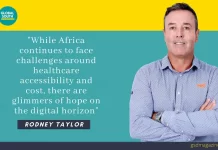
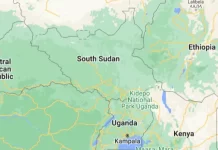
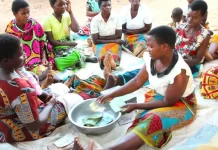




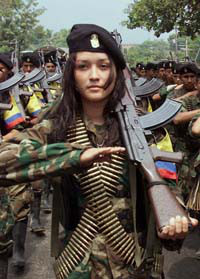

God artikkel. Takk.
Yet another article to bash Chinese aid. I just commented yesterday in another article about DFID, and I’m repeating the same again. Of course, all countries have their political interests when they give aid. Some seek direct influence, some are more subtle. Countries like Norway, Britain, and Germany promote certain sets of values with aid. Chinese aid is straightforward, and mostly for infra projects, so there is no fuss. But it’s no secret that the Chinese model is working, whether it’s about containing COVID or implementing effective foreign aid.
This is a very good read, but maybe a difficult to follow for a non-native speaker like me. Anyway, the main idea is aid doesn’t work. Didn’t know that Malawi was in such a mess. It isn’t covered in media that much. This article should have been written in a “layman” journalism style so that everyone could understand how miserable these international development projects have been in parts of Africa.